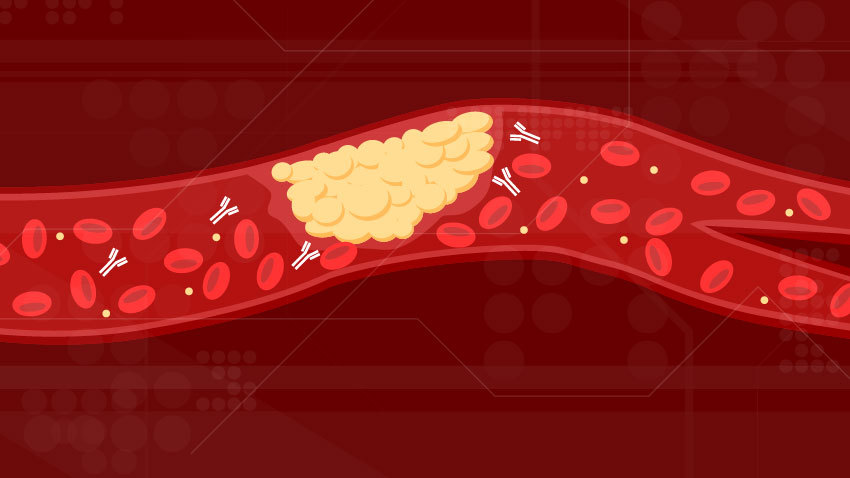Blood-clot-promoting autoantibodies have been found in at least half of the serum samples collected from 172 patients hospitalized with COVID-19. These autoantibodies—which are also linked to a dangerous autoimmune condition called antiphospholipid syndrome—are promising therapeutic targets. For example, if the clot-causing autoantibodies were to be neutralized or removed from the blood, perhaps by plasmapheresis, clotting could be lessened in patients with severe COVID-19.
The new finding appeared November 2 in the journal Science Translational Medicine, in an article titled, “Prothrombotic autoantibodies in serum from patients hospitalized with COVID-19.” The article reports that scientists based at the University of Michigan tested the COVID-19 patients’ serum samples for eight types of autoantibodies that target phospholipids and phospholipid-binding proteins (aPL antibodies).
“These aPL antibodies included anticardiolipin IgG, IgM and IgA; anti-β2 glycoprotein I IgG, IgM, and IgA; and anti-phosphatidylserine/prothrombin (aPS/PT) IgG and IgM,” the article’s authors wrote. “Higher titers of aPL antibodies were associated with neutrophil hyperactivity including the release of neutrophil extracellular traps (NETs), higher platelet counts, more severe respiratory disease, and lower clinical estimated glomerular filtration rate.”
Antiphospholipid syndrome antibodies have been studied for years at Michigan Medicine. Still, the connection between these autoantibodies and COVID-19 was unexpected, admitted one of the study’s two co-corresponding authors, Jason Knight, MD, PhD, a rheumatologist at Michigan Medicine. He recalled the surprise the Michigan Medicine scientists experienced when they learned that half of the patients hospitalized with COVID-19 were positive for at least one of the autoantibodies.
“In patients with COVID-19, we continue to see a relentless, self-amplifying cycle of inflammation and clotting in the body,” elaborated the study’s other co-corresponding author, Yogendra Kanthi, MD, an assistant professor of cardiovascular medicine at Michigan Medicine. “Now we’re learning that autoantibodies could be a culprit in this loop of clotting and inflammation that makes people who were already struggling even sicker.”
The Michigan Medicine scientists found about half of the patients who were very sick with COVID-19 were exhibiting a combination of high levels of both the dangerous antibodies and super-activated neutrophils, which are destructive, exploding white blood cells. In April, the team was the first to report that patients hospitalized for severe COVID-19 had higher levels of neutrophil extracellular traps in their blood.
To learn more, they studied the explosive neutrophils and the COVID-19 antibodies together in mouse models to see if this could be the dangerous combination behind the clots.
“Antibodies from patients with active COVID-19 infection created a striking amount of clotting in animals—some of the worst clotting we’ve ever seen,” noted Kanthi, who is a Lasker Investigator at the National Institutes of Health’s National Heart, Lung, and Blood Institute. “We’ve discovered a new mechanism by which patients with COVID-19 may develop blood clots.”
The researchers say these findings aren’t yet ready for clinical practice, but they add a new perspective to the robust thrombosis and inflammation research in patients with COVID-19.
The Michigan Medicine scientists now want to know whether severely ill patients with high levels of these autoantibodies would have better outcomes if the autoantibodies were to be blocked or removed. If so, that might warrant an aggressive treatment like plasmapheresis, which is commonly used in severe autoimmune diseases. It involves draining blood through an IV, filtering it, and replacing it with fresh plasma that doesn’t contain those antibodies associated with blood clots.
“We know people with the highest levels of autoantibodies did worse in terms of respiratory function, and the antibodies caused inflammation even in healthy cells” said Yu Zuo, MD, the study’s first author and an assistant professor of internal medicine and a rheumatologist at Michigan Medicine.
“We don’t yet know what is triggering the body to produce these antibodies,” Knight acknowledged. “So, the next step would be additional research to identify the triggers and the targets of the antibodies.”
In addition, these findings bring up new questions surrounding the use of convalescent plasma as a possible COVID-19 treatment, but the team says more research is needed to examine this concern.
The researchers noted that the serum samples in their study were not acquired at a single defined point during the time of hospitalization, and suggested that future studies should systematically track these antibodies through the course of the disease, including after patients are discharged from the hospital.
“We’re now investigating how long these antibodies remain in circulation after recovery from the novel coronavirus,” Knight pointed out. The researchers are also currently running a randomized clinical trial called DICER, which is testing a well-known anticlotting agent, dipyridamole, in patients with COVID-19 to determine whether it’s more effective than a placebo in reducing excessive blood clots.
“Dipyridamole is an old drug that is safe, inexpensive, and scalable,” Kanthi noted. “The FDA approved it 20 years ago to prevent clotting, but we only recently discovered its potential to block this specific type of inflammation that occurs in COVID.”



